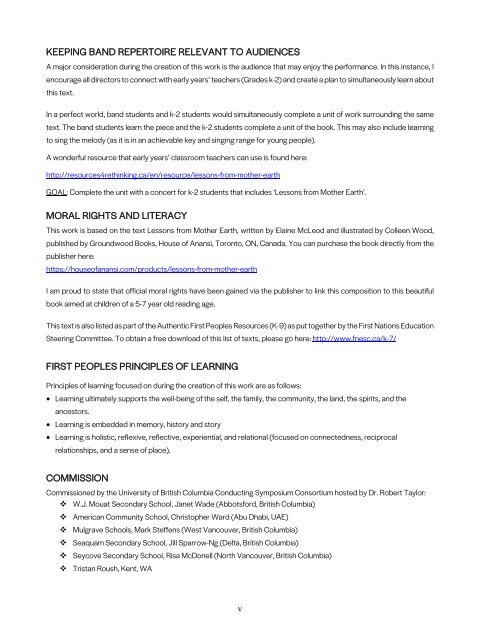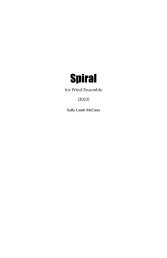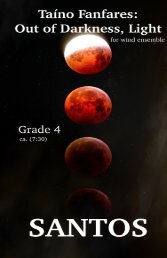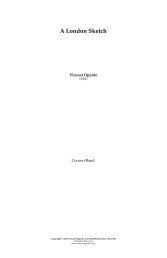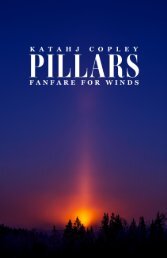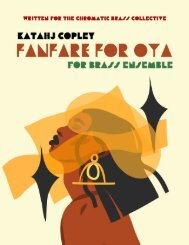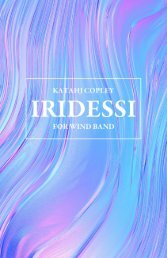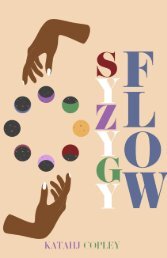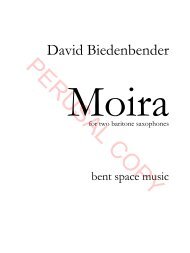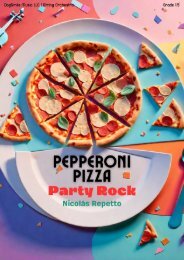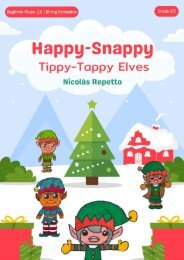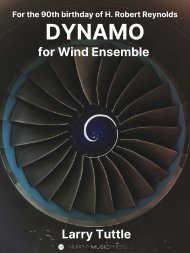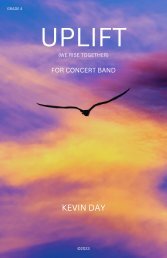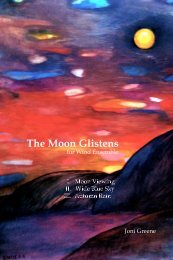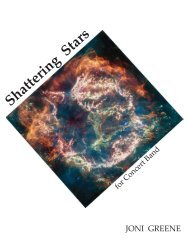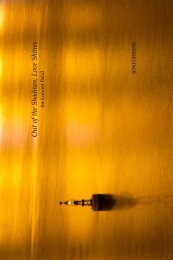Lessons from Mother Earth_SCORE
You also want an ePaper? Increase the reach of your titles
YUMPU automatically turns print PDFs into web optimized ePapers that Google loves.
KEEPING BAND REPERTOIRE RELEVANT TO AUDIENCES<br />
A major consideration during the creation of this work is the audience that may enjoy the performance. In this instance, I<br />
encourage all directors to connect with early years’ teachers (Grades k-2) and create a plan to simultaneously learn about<br />
this text.<br />
In a perfect world, band students and k-2 students would simultaneously complete a unit of work surrounding the same<br />
text. The band students learn the piece and the k-2 students complete a unit of the book. This may also include learning<br />
to sing the melody (as it is in an achievable key and singing range for young people).<br />
A wonderful resource that early years’ classroom teachers can use is found here:<br />
http://resources4rethinking.ca/en/resource/lessons-<strong>from</strong>-mother-earth<br />
GOAL: Complete the unit with a concert for k-2 students that includes ‘<strong>Lessons</strong> <strong>from</strong> <strong>Mother</strong> <strong>Earth</strong>’.<br />
MORAL RIGHTS AND LITERACY<br />
This work is based on the text <strong>Lessons</strong> <strong>from</strong> <strong>Mother</strong> <strong>Earth</strong>, written by Elaine McLeod and illustrated by Colleen Wood,<br />
published by Groundwood Books, House of Anansi, Toronto, ON, Canada. You can purchase the book directly <strong>from</strong> the<br />
publisher here:<br />
https://houseofanansi.com/products/lessons-<strong>from</strong>-mother-earth<br />
I am proud to state that official moral rights have been gained via the publisher to link this composition to this beautiful<br />
book aimed at children of a 5-7 year old reading age.<br />
This text is also listed as part of the Authentic First Peoples Resources (K-9) as put together by the First Nations Education<br />
Steering Committee. To obtain a free download of this list of texts, please go here: http://www.fnesc.ca/k-7/<br />
FIRST PEOPLES PRINCIPLES OF LEARNING<br />
Principles of learning focused on during the creation of this work are as follows:<br />
• Learning ultimately supports the well-being of the self, the family, the community, the land, the spirits, and the<br />
ancestors.<br />
• Learning is embedded in memory, history and story<br />
• Learning is holistic, reflexive, reflective, experiential, and relational (focused on connectedness, reciprocal<br />
relationships, and a sense of place).<br />
COMMISSION<br />
Commissioned by the University of British Columbia Conducting Symposium Consortium hosted by Dr. Robert Taylor:<br />
v W.J. Mouat Secondary School, Janet Wade (Abbotsford, British Columbia)<br />
v American Community School, Christopher Ward (Abu Dhabi, UAE)<br />
v Mulgrave Schools, Mark Steffens (West Vancouver, British Columbia)<br />
v Seaquam Secondary School, Jill Sparrow-Ng (Delta, British Columbia)<br />
v Seycove Secondary School, Risa McDonell (North Vancouver, British Columbia)<br />
v Tristan Roush, Kent, WA<br />
v


